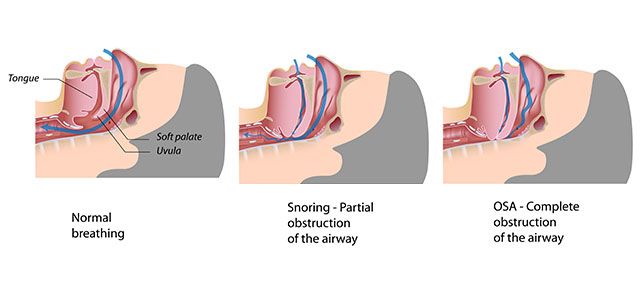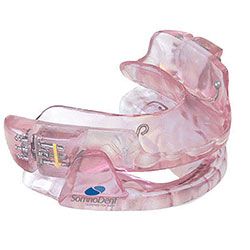Do you feel like you’re in bed with a chainsaw?
Frequent snoring can have far more serious consequences for your partner than being banished to the couch.
It could be a sign of obstructive sleep apnoea (OSA), a condition where the airway is repeatedly obstructed during sleep due to relaxation of the muscles around the throat and the tongue. This obstruction is made worse when lying on your back or after a few drinks. Snoring is the sound of the vibration made when air is travelling through a partially obstructed airway.

When the airway is completely obstructed, breathing can stop for a period of time resulting in blood oxygen levels to plummet. Your body considers this to be a cardiovascular emergency, so what do your heart and blood vessels do to compensate? They strain to make your blood pressure temporarily skyrocket, just to get more blood to your oxygen starved cells.
Temporary increases in blood pressure are ok, and necessary for survival. But what if this happens every night? Every hour of the night? Or even every minute of the night? Think of the strain to the heart and the damage that occurs to the walls of our blood vessels when blood pressure is elevated to those emergency levels for hours and hours, years on end.
Whenever an apnoea occurs, the body eventually triggers a mini-awakening from sleep called an ‘arousal’ to force a breath (more like a gasp) to occur. In OSA, this process is repeated over and over and the person never really falls into a deeper level of sleep due to these frequent arousals. No wonder they wake up tired! The severe drops on blood oxygen, increased blood pressure and disturbed sleep patterns have a negative effect on almost every aspect of the body. The cells in every organ of our bodies need sleep to recover, process metabolic waste and regenerate.
Its no surprise that obstructive sleep apnoea is one of the most potentially dangerous conditions around. In fact, many studies show that those diagnosed with moderate to severe OSA have a significantly increased risk of death from a cardiovascular incident.
The top signs and symptoms associated with OSA are:
1. Snoring
2. Frequent headaches
3. Daytime fatigue/sleepiness
4. Poor concentration
5. Depression/anxiety/moodiness
6. Teeth grinding and clenching
7. Frequent night-time urination
How do dentists help?
Dentists are in a great position to assess the airways! We look at the tonsils, size of the tongue, position of the jaws and other signs such as worn down teeth (grinding is a common symptom of OSA). At North Sydney Dental Practice, every patient is screened for OSA. If you present with any signs, we will conduct further questioning to see you need to be referred for a formal diagnosis via a sleep study.
 |
Dentists are also involved in the treatment of most types of OSA. We construct custom fabricated devices that keep the airway open through the night by holding the lower jaw in a forward position (like a bull dog!). You will notice that when you stick your lower teeth out, the tongue and the front wall of your throat are also held forward, giving the space required for air to flow in and out of the lungs unobstructed.
← An example of a oral appliance used to treat sleep apnoea |
OSA is also one the most under-diagnosed medical conditions, due to the fact that many people think that chronic snoring is normal. But we now know it should be taken very seriously. If you think you or your partner may be suffering from OSA, ask your GP or dentist about it! It could save a life.
More tips on dealing with and preventing snoring can be read here:
